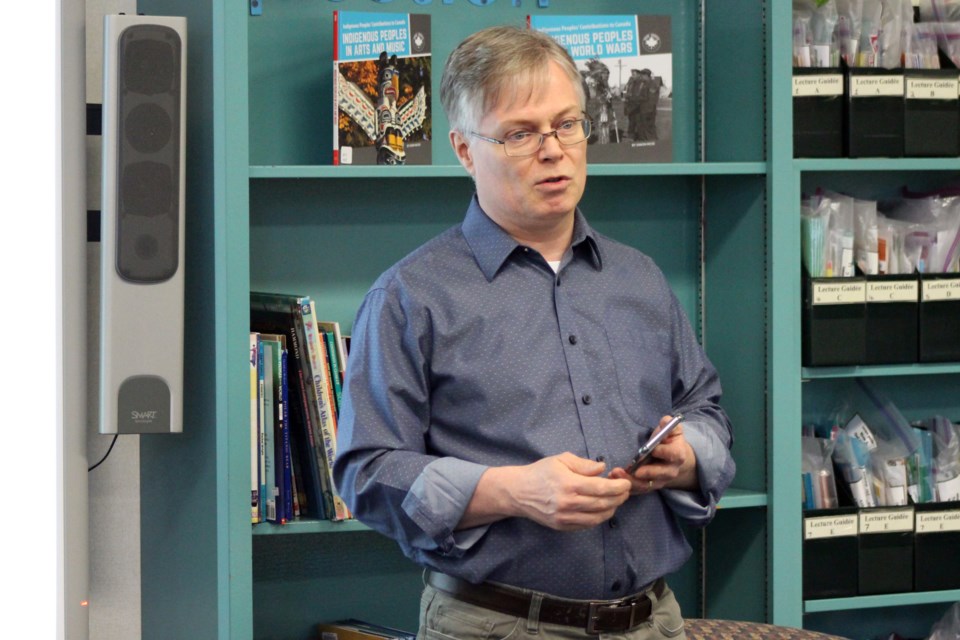BONNYVILLE – Lakeland Catholic School District (LCSD) is at a bit of a crossroads when it comes to technology in their schools.
Clint Elliott, director of technology, outlined the different options the division has when it comes to devices for students due to the “fiscally challenging environment provincially.”
“We’re now entering a new defining phase of technology in our schools, one that’s ongoing and sustainable,” he noted to the board of trustees during their Jan. 22 meeting. “We’ve focused previously on Smart Boards, Switches, access points, and servers.”
Currently, LCSD has just over 1,000 Chromebooks, around 1,400 iPads, and roughly 200 MacBooks for their pupils.
“Out of these devices, about 1,000 of them will be out of date within the year. We have 400 iPads right now that are about two years out of date. They still work perfectly fine and we will continue to use them, being out of date for an iPad isn’t that big of a deal,” detailed Elliott, adding Chromebooks reaching the end of their life expectancy is a bit of a bigger issue.
“Google says you get five to six years with a Chromebook and then they quit supporting it, which means it will still work after that, but at any time, they can make a change and it doesn’t work anymore. That means we can’t use them for Provincial Achievement Tests (PATs) or Provincial Diploma Exams (PDEs). We have to put them, when they’re out of date, in grades where they’re not mission critical.”
Another issue with Chromebooks is that while they’re a cheaper option to purchase, they put a lot of demand on the Internet when in use.
“While you’re saving money on the device, you’ve got to pay more for the bandwidth and it isn’t cheap. When you factor the two together, are they any cheaper than an iPad or equivalent device? I suspect that they’re coming out about the same in the wash, because we spend a lot of money on bandwidth,” Elliott explained.
There are four computer labs across LCSD, with two in Notre Dame High School (NDHS), one at Assumption Jr./Sr. High School, and another supplemented with iPads at Dr. Bernard Brosseau School.
According to Elliott, one of the ways LCSD is exploring reducing costs is by lowering the number of devices available for students. They could go down to a two-to-one ratio for Chromebooks in the future compared to the one-to-one they have in most of their schools right now.
Well over $200,000 of the technology budget, Elliott stated, goes toward software licensing and it’s seen a hike since he took over the department four years ago. One of the main reasons for this was due to the increase in demand from schools.
“We’re paying for the price of our own success,” expressed Elliott. “As our students go up, our bandwidth increases, everything goes up and technology feels it first because you can’t lie about bandwidth. If students are using it, we feel it right away and everything’s gone up. Our staffing, students, and we’ve added another school. It all comes back, and goes through the tech shop so those demands have gone up.”
Trustee Mary Anne Penner said, “I found that very interesting, and it certainly gives us a lot to think about when it comes to where our dollars are going.”
When it comes to devices, Elliott stressed the importance of programs being a tool for student success.
“We shouldn’t be spending money on devices just for the sake of it,” he exclaimed.
Elliott said the school division’s return on investment for student success is hit or miss in their schools, because some are excelling while others aren’t.
“What we found is when technology is integrated into a program that puts pedagogy first, the results are outstanding. Where teachers are using the technology to meet the learning outcomes in our schools, we’re seeing very nice results.”
Elliott believes this form of educational assistance is here for the foreseeable future, and LCSD has to determine how it’s going to fit within the division.
“We have to shape technology to realize the synergies that we want to see in our classrooms. As long as we’re prepared to do this, I think educational technology is a worthwhile expense. But, we need to work and make sure our teachers know what they’re doing in the classroom with technology otherwise, I’m the first to admit, we’d be wasting our money on it… We need to find, as a division, what we can afford, support and train our teachers to use those devices properly so our students are the winners.”
Before any changes are made, Elliott will be looking into the different options available ahead of presenting them to the board.



